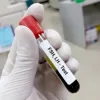Miscarriages – How IVF Can Help
by Sareena Sharma, Reproductive Biologist at IVF London

Suffering from a miscarriage can be one of the most challenging periods in a couple’s life. It is a very taboo subject that we all fail to talk openly about.
It can shake a partnership and leave expectant parents struggling mentally and physically. The festive period, birthdays, and anniversaries can bring these feelings back up. We hope that this blog can help those suffering from miscarriage, gain some clarity and understanding.
A miscarriage is the loss of a pregnancy in the first 23 weeks of pregnancy.
According to current estimates, only 50% of pregnancies progress to the stage where the pregnant woman or their doctor recognises them.
But, even then, one in five pregnancies will sadly end in miscarriage. These numbers are much higher than people imagine, and we think it is good to know that you are not alone on this journey.
Miscarriage is the most common complication of pregnancies and is “random”. Most likely, a single miscarriage will be due to a genetic abnormality in the embryo, and the frequency of this occurring does increase with maternal age. The random nature, however, does not mean that this type of miscarriage is any less upsetting for those involved. It is essential to allow any emotions to release, and you reach out for help and support if needed.
The main signs of a miscarriage are vaginal bleeding, cramping, and pain in your lower abdomen. If you have vaginal bleeding, contact a GP or your midwife as soon as possible; where most GPs will refer you to an early pregnancy unit at your local hospital straight away if necessary.
If you have reached 14 weeks or more, a doctor may refer you to a maternity or gynaecology ward.
It is essential, however, to note that light vaginal bleeding is relatively common during the first trimester of pregnancy and does not always indicate a miscarriage.
An early miscarriage occurs before 12 completed weeks, whilst a late miscarriage occurs between 12 and 23 weeks.
A late miscarriage is closely related to, and shares similar risk factors to preterm birth and rupture of fetal membranes (waters breaking). If you have a late miscarriage, you must not ignore the risks. These risks can include infections and disturbances of the bacterial groups that live in the vagina, such as bacterial vaginosis, aerobic vaginitis, and group B streptococcus.
Late miscarriages are extremely upsetting and can leave expectant parents traumatised. It is essential to seek help if you are struggling with the emotions following a late miscarriage; support is always available.
For some women, recurrent miscarriages occur- the loss of three or more consecutive pregnancies. Recurrent miscarriage happens often, but still affects about 1% of women. If you are one of these women to whom this has happened, there are things you can consider doing to prevent it from reoccurring.
Our team is on hand to support you, and we strongly recommend calling for an appointment as soon as possible.
Immunological factors, hormone imbalance, and parental chromosomal disorders may be involved.
Still, most women who miscarry three or more pregnancies, miscarry genetically normal babies, so it is best this is investigated.
It is also uncommon to miscarry after eight weeks, so we should investigate pregnancies lost after eight weeks if the baby was viable up to that stage.
We tend not to recommend an investigation to women who have had a single first-trimester loss before eight weeks; however, we offer screenings for infections, immunological disorders, chromosomal abnormalities, and blood disorders where appropriate.
Unfortunately, most of the time, there is nothing you can do to prevent a miscarriage. We understand how hard this is for parents and can offer support wherever required.
Living a healthy lifestyle is essential for you and your baby. We recommend taking a daily prenatal vitamin or folic acid supplement, ideally beginning a few months before conception. Try to get to your healthiest weight possible, and it is also preferable that during pregnancy, you limit caffeine and avoid drinking alcohol, smoking, and using illicit drugs.
During IVF treatment, we can carry out a number of tests that may help minimise your risk of miscarriage.
Based on research and the positive outcomes of our clients, we have created a definitive list of treatments we can carry out to help lower the chances of miscarriage.
Check your Thyroid Stimulating Hormone levels (TSH)
We offer complete blood hormone profile tests to our IVF clients. There is a link between TSH levels and miscarriage, so it is essential to take this test so that the client can take medication before egg retrieval.
Have a hysteroscopy
A hysteroscopy is an internal scan under light sedation. We can check for growths, blockages, and damage to the uterus, which may cause a miscarriage, so it is great to have this checked before trying for a baby.
Choose suitable progesterone
We give progesterone to IVF clients to maintain the pregnancy. There are many types of pills, pessaries, gels and injections available, and it is essential to get the one which works best for the client.
Know your blood
Thick or clotting blood can lead to miscarriage. IVF clients get tested for identifiable blood disorders before treatment. Many of these disorders, can be treated with medication, which is very good to know.
Cervical Stitch
A cervical stitch in early pregnancy can prevent your cervix from opening and potentially initiate a miscarriage.
We support you every step of the way, so feel free to reach out if you wish to discuss anything.



